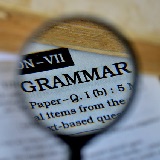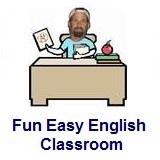|
|
| |
|
|
| |
|
|
| Fun Easy English Classroom May 30 |
|
| |
Classroom
Today
Learn about
simple present |
|
 Simple
Present Simple
Present
Today in the Fun Easy English classroom you are going to learn about
simple present
an important part of English grammar. |
 Hey
if you cannot understand something on this page, Hey
if you cannot understand something on this page,
then use the Fun Easy English
dictionary
(opens in a new window) |
|
|
|
 Grammar:
Simple Present Grammar:
Simple Present
Definition of
simple present. |
- Simple present: "I go." For many
verbs, this is used to express habit or ability as in "I
play the guitar."
|
| tense &
aspect |
aspect |
|
simple |
perfect |
progressive |
perfect progressive |
|
tense |
past |
simple
past |
past
perfect |
past
progressive |
past
perfect
progressive |
|
present |
simple
present |
present
perfect |
present
progressive |
present
perfect
progressive |
|
future |
simple
future |
future
perfect |
future
progressive |
future
perfect
progressive |
|
|
Simple Present Examples |
- Simple present:
- I paint the house.
- I eat breakfast this morning.
- I go to the bookstore with my best friend.
|
|
Fun Easy English Grammar Lessons |
|
 From
YOUR Teacher: Simple
Present From
YOUR Teacher: Simple
Present
Notice in the examples above the action in each sentence
expresses a habit or ability. |
|
|
|
|
|
Additional Lessons |
 About These
Lessons About These
Lessons
The following classroom lessons are great for students
who want additional conversation, listening, and reading
practice. |
-
Conversation Lesson -
Advanced
Level. Dialogs for everyday use.
Short situational dialogs for students of English as
a Foreign (EFL) or Second (ESL) Language with a
written conversation and a conversation notes
section.
|
 Conversation Lesson
2 - Informal Greetings and Farewells Conversation Lesson
2 - Informal Greetings and Farewells
(Advanced -
Conversation, Reading)
Dialogs for everyday use. Short situational dialogs for
students of English as a Foreign (EFL) or Second (ESL)
Language. |
Informal Greetings and Farewells
JANE: Hi, Helen! How’s it going?
HELEN: Fine, thanks — and you?
JANE: Just fine. Where are you off to?
HELEN: To the library. I’ve got a history
exam next week and need to start studying. Ugh.
JANE: Oh, no. Well, I’ll see you later
then. Good luck!
HELEN: Thanks. See you later. |
|
Conversation Notes |
- “Hi” is an informal way of saying “hello.” Notice that
the “i” sound in “hi” is extended, to show that Jane is very pleased to see
Helen.
- “How’s it going?” is an informal way of saying “How are
you?”
- “Fine, thanks—and you?” Notice the rising intonation on
“and you?” This shows that Helen is interested in what Jane has to say.
- “Where are you off to?” is an informal way of saying
“Where are you going?” Notice the falling intonation since this is an
information question, not a “yes/no” question.
- “To the library.” Notice that Helen does not say “I’m
going” here because that information was already established in the question
“Where are you off to?”
- “Oh, no” is a way of saying “I sympathize with you” or
“I understand you are not happy.”
- “See you later” is an informal way of saying “goodbye.”
|
|
Source: U.S. State Department |
|
Additional Conversation |
 Conversation Conversation
This is a collection of 30 situational conversations
which focus on a wide variety of communicative and
natural encounters in English....these
lessons are for beginning students. |
 Conversation Conversation
This is a collection of 36 situational conversations
which focus on spoken American English in a relatively
natural way....these
lessons are for intermediate students. |
 Conversation Conversation
English conversation lessons. 52
lessons covering pronunciation, speaking,
writing, and grammar topics....these
lessons are for beginning students. |
 Conversation Conversation
English conversation lessons. 30
lessons focusing mostly on communication and
grammar topics....these
lessons are for intermediate students. |
|
|
|
|
|
|
|
 Hey Students, Hey Students,
Use this dictionary and reference to look up any words you do not
understand in Fun Easy English.
Note: search opens in a new tab. |
|
|
|
|
|
Search Fun Easy English |
|
|
|
|
|
|
|
|
|
|
|
|
|
|
|
About
Contact
Copyright
Resources
Site Map |